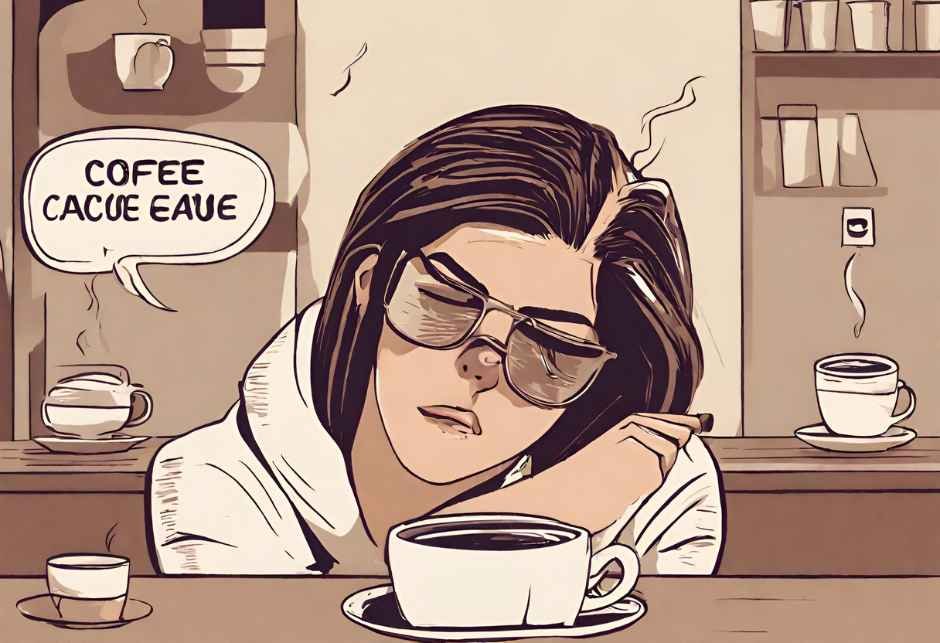On this website, some posts contain affiliate links, which means that if you buy a product using my link, I may earn a commission.
Drinking a cup of coffee in the morning may make you feel tired due to the effects of caffeine, which interferes with brain chemicals that regulate the sleep-wake cycle. Once caffeine is fully metabolized, it can lead to fatigue.
However, coffee itself does not directly cause tiredness. Instead, it is the caffeine it contains that can eventually result in fatigue if consumed regularly. Factors such as adenosine blockage, caffeine tolerance, dehydration, and sugar crashes can also contribute to feeling tired after drinking coffee.
Additionally, daily coffee consumption can lead to the body adapting by creating more adenosine receptors, causing energy levels to drop and creating a dependency on coffee to combat withdrawal symptoms.
How Does Caffeine Affect Alertness?
Drinking coffee in the morning can make you feel tired later in the day due to the effects of caffeine. Caffeine interferes with brain chemicals that regulate the sleep-wake cycle, increasing alertness initially. However, once caffeine is metabolized, it can lead to fatigue.
refreshing and restful. The effects of caffeine on individual sleep patterns can vary, so some people may find that drinking coffee in the morning leads to fatigue later in the day. This could be due to factors such as dehydration, a sugar crash, blocked adenosine receptors, or a high caffeine tolerance. Additionally, regular coffee consumption can lead to a build-up of adenosine receptors in the body, causing a drop in energy levels and a reliance on coffee to combat withdrawal symptoms. It’s important to note that the timing of coffee consumption can also impact sleep, as caffeine can disrupt the natural sleep-wake cycle. Therefore, it may be best to avoid drinking coffee immediately upon waking up in the morning to ensure a good night’s sleep.
Can Coffee Cause Fatigue?


Drinking coffee in the morning can potentially cause fatigue later in the day. This is because caffeine, found in coffee, can interfere with the brain’s sleep-wake cycle and make you feel tired once it is completely metabolized. Coffee also acts as a diuretic and can lead to dehydration, which can contribute to feelings of fatigue.
| If drinking a cup of coffee makes a person feel tired, the effects of caffeine may be responsible. Caffeine increases alertness by interfering with certain chemical processes in the brain that regulate the sleep-wake cycle. However, once the body completely metabolizes caffeine, it can make people feel tired. Coffee itself won’t instantly make you feel tired, but the caffeine it contains may actually lead to fatigue after regularly drinking it over time. One reason for this is the buildup of adenosine, a molecule naturally produced by the body that can make you feel sleepy. Caffeine blocks the effects of adenosine, but when the caffeine wears off, adenosine can cause fatigue. Dehydration can also play a role in feeling tired after consuming coffee, as coffee is a diuretic and can contribute to fluid loss. Additionally, if coffee is consumed with sweeteners containing sugar, a resulting sugar crash can also lead to feelings of tiredness. It’s important to be mindful of your caffeine intake and stay hydrated to avoid feeling tired after drinking coffee regularly. |
Factors Impacting Tiredness From Coffee
Coffee can make you feel tired in the morning due to the effects of caffeine. While caffeine initially increases alertness, once it is completely metabolized by the body, it can result in fatigue. Other factors like dehydration, sugar crash, and blocked adenosine can also contribute to feeling tired after drinking coffee.
| If drinking a cup of coffee makes a person feel tired, the effects of caffeine may be responsible. Caffeine increases alertness by interfering with certain chemical processes in the brain that regulate the sleep-wake cycle. However, once the body completely metabolizes caffeine, it can make people feel tired. Adenosine, a molecule naturally produced by the body, can also contribute to sleepiness. Coffee contains stimulating caffeine, but it has its limits. As the effects of caffeine wear off, adenosine can make you feel sleepy. Additionally, coffee’s diuretic effects can lead to dehydration, which can cause fatigue. Moreover, the influence of sugar in coffee can result in a sugar crash, further contributing to tiredness. It’s important to note that individual tolerance to caffeine and other factors may also play a role in how coffee affects sleepiness in the morning. |
Other Reasons For Feeling Tired After Coffee
|
If drinking a cup of coffee makes a person feel tired, the effects of caffeine may be responsible. Caffeine increases alertness by interfering with certain chemical processes in the brain that regulate the sleep-wake cycle. However, once the body completely metabolizes caffeine, it can make people feel tired. The way that coffee affects your body may leave you feeling tired due to:
Coffee itself won’t instantly make you feel tired, but the caffeine it contains may actually lead to fatigue after regularly drinking it over time. High sleep debt and being in an energy dip can also contribute to feeling tired after consuming coffee. So, while coffee can initially provide an energy boost, it’s important to be mindful of your caffeine intake and consider these factors that can potentially make you feel tired after drinking it. |
The Connection Between Morning Coffee And Later Fatigue
If drinking a cup of coffee makes a person feel tired, the effects of caffeine may be responsible. Caffeine increases alertness by interfering with certain chemical processes in the brain that regulate the sleep-wake cycle. However, once the body completely metabolizes caffeine, it can make people feel tired. Adenosine is a molecule that’s naturally produced by your body and can make you feel sleepy. Coffee itself won’t instantly make you feel tired, but the caffeine it contains may actually lead to fatigue after regularly drinking it over time. Apart from caffeine, other factors may contribute to post-caffeine sleepiness, including the diuretic effect of coffee and the impact of sugar content on energy levels. Adenosine, a neurotransmitter in our central nervous system, also plays a role in causing fatigue when the caffeine wears off.
| Possible Reasons for Post-Caffeine Sleepiness |
|---|
| Adenosine |
| Diuretic effect |
| Sugar content |
Coffee, with its stimulating caffeine, does have its limits. As the effects of adenosine build up, dehydration occurs, or there’s a sugar crash, you might start feeling tired. However, it’s important to note that feeling tired after coffee consumption can also be attributed to factors other than caffeine. High sleep debt and being in an energy dip can contribute to the feeling of fatigue. So, while coffee may provide a temporary boost in alertness, it’s essential to understand the potential factors that can contribute to post-caffeine sleepiness.


Credit: thegoodchocolatier.com
How Daily Coffee Consumption Affects The Body
If drinking a cup of coffee makes a person feel tired, the effects of caffeine may be responsible. Caffeine increases alertness by interfering with certain chemical processes in the brain that regulate the sleep-wake cycle. However, once the body completely metabolizes caffeine, it can make people feel tired. Coffee itself won’t instantly make you feel tired, but the caffeine it contains may actually lead to fatigue after regularly drinking it over time. This is because caffeine blocks the effects of adenosine, a molecule that’s naturally produced by your body and can make you feel sleepy.
Coffee also acts as a diuretic, leading to dehydration, which can result in feelings of fatigue. Additionally, if coffee is consumed with high amounts of sugar, it can cause a sugar crash, resulting in low energy levels. Moreover, having a high tolerance to caffeine can also make coffee less effective in boosting energy levels, leading to reliance on coffee just to combat withdrawal symptoms such as irritability, headaches, and exhaustion.
Drinking caffeine in the morning can initially provide a surge of energy, but it can also lead to sleepiness later in the day. This can be due to feeling relatively tired compared to the initial energy boost or as a result of high sleep debt and being in an energy dip. Therefore, it’s important to be mindful of the effects of coffee on your body and consider moderating coffee consumption to maintain optimal energy levels throughout the day.
Frequently Asked Questions Of Does Coffee Make You Tired In The Morning?
Why Does Coffee Make Me More Tired In The Morning?
Drinking coffee in the morning can make you more tired due to caffeine. Caffeine interferes with chemical processes in the brain that regulate the sleep-wake cycle. Once the body metabolizes caffeine, it can lead to fatigue. Additionally, coffee can cause dehydration and a sugar crash.
What Happens To Your Body When You Drink Coffee Every Morning?
Drinking coffee every morning can lead to the body adapting by creating more adenosine receptors. This can result in decreased energy levels and the need for coffee to combat withdrawal symptoms like irritability, headaches, and exhaustion. Caffeine can also affect sleep, making it harder to fall asleep and reducing the quality of sleep.
Is It Ok To Drink Coffee After Waking Up In The Morning?
It is generally okay to drink coffee after waking up in the morning. However, be aware that the effects of caffeine can interfere with your sleep-wake cycle and make you feel tired once it is metabolized by your body. Also, excessive consumption of caffeine can lead to fatigue, irritability, and other withdrawal symptoms.
Does Coffee Affect Your Sleep In The Morning?
Drinking coffee in the morning can affect your sleep. The caffeine interferes with the brain’s sleep-wake cycle, making you feel more alert. However, once the caffeine is metabolized, it can make you feel tired. Caffeine can also reduce deep, restorative sleep, leaving you feeling less refreshed.
Conclusion
Drinking coffee in the morning can have varying effects on individuals. While caffeine helps increase alertness, it can lead to fatigue once it is completely metabolized by the body. This happens when adenosine, a molecule that naturally makes us feel sleepy, is blocked by caffeine.
Other factors such as dehydration, a sugar crash, and high caffeine tolerance can also contribute to feeling tired. It’s important to listen to your body and understand how coffee affects you personally. If you consistently feel fatigued after drinking coffee, it may be worth exploring other alternatives to stay energized throughout the day.
On this website, some posts contain affiliate links, which means that if you buy a product using my link, I may earn a commission.

